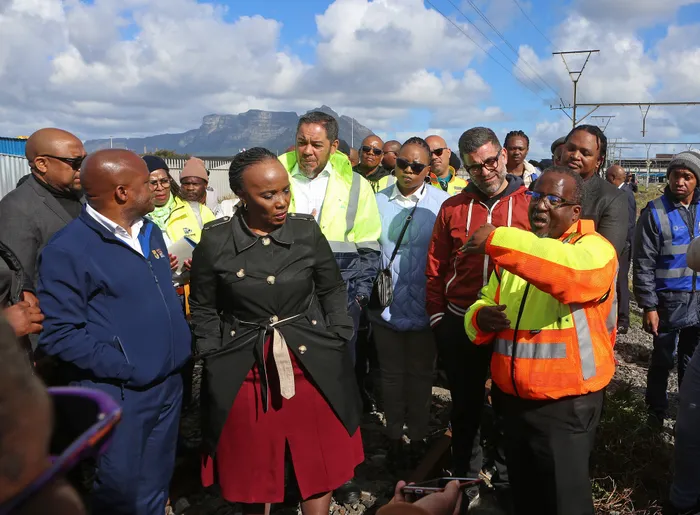Prasa’s plans on track to relocate squatters living on central line

Minister of Public Works and Infrastructure Sihle Zikalala, Minister of Transport Sindisiwe Chikunga and PRASA acting regional manager Raymond Maseko during the walkabout at Langa Station.
The Passenger Rail Agency of South Africa (PRASA) has set aside R600 million to accelerate the recovery plan for the central line and to repair the damage caused to it by the illegal erection of shacks.
The central line, a crucial rail network in Cape Town, is running at a reduced capacity as a result of informal settlements blocking the railway around Langa and Philippi.
About 1254 people are now living in illegally built shacks over railway lines just meters away from Langa station on the railway lines which carry trains to Khayelitsha and Kapteinsklip stations.

According to PRASA acting regional manager Raymond Maseko, of the 650 000 commuters transported every day in the Western Cape by PRASA, 420 000 of them made use of the central line.
Mr Maseko was speaking during the walkabout in Langa where national government ministers met stakeholders on the matter of the illegally occupied PRASA central line and to evaluate the progress of plans to relocate the remaining occupants living illegally along the railway line. Their removal is part of Operation Bhekela.
Part of the delegation at Langa were Transport Minister Sindisiwe Chikunga, Human Settlements Minister Mmamokolo Kubayi and Public Works and Infrastructure Minister Sihle Zikalala.

Mr Maseko emphasised the importance of the central line which enabled commuters to travel to northern and southern suburbs of the city. He added that bringing trains back would reduce the cost of travelling by public transport.

Vendors from Nyanga station are looking forward to seeing trains back to the Central line.
Sakkie Hendricks who has been a vendor for 15 years said it would mean a lot to him to have commuters back at the station. “They bring us more money. Ever since the trains stopped working the business is slow and quiet," he said.
Another vendor, a woman who sells fruit and veg and did not want her name to be published, said: “ Having the trains operational will benefit me a lot because early in the morning they pass by and buy fruits, then vegetables when they come back to home. At the moment the business is slow," she said
